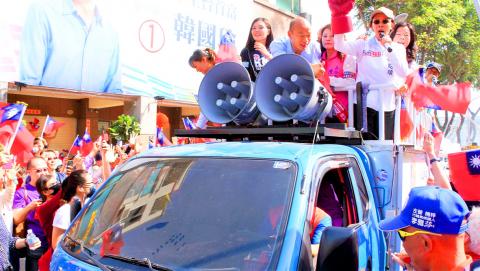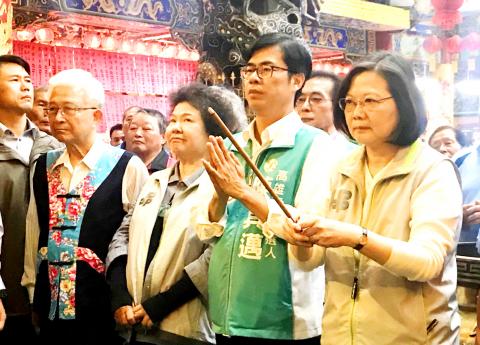China has been employing “a Russia-style influence campaign” to meddle in Taiwan’s elections, the New York Times said on Thursday.
The report, titled “Specter of Meddling by Beijing Looms Over Taiwan’s Elections” and authored by Chris Horton, said that as voters prepare to head to the polling booths today for the nine-in-one local elections, “concerns are growing that Beijing’s long effort to sway [Taiwan’s] politics has been armed with a new weapon: a Russia-style influence campaign.”
“Taiwan officials are sounding alarms at what they say is a campaign by Beijing to spread disinformation that serves its agenda by exploiting [Taiwan’s] freewheeling public discourse,” the newspaper said, adding that officials “say the population of 23 million is regularly fed misleading information in the news media and on social networks that range from unverified footage of large-scale Chinese military drills to false reports of stranded travelers being abandoned” by the government.

Photo: CNA
The volley of misinformation appeared aimed at undermining President Tsai Ing-wen’s (蔡英文) administration and the Democratic Progressive Party (DPP), it said.
“Authorities say they suspect that Beijing is also illegally funneling money to political campaigns through Taiwan businesses in mainland China. Late last month, the government said that it was building cases against candidates who were being funded by Beijing and that it had shut down two underground money exchanges through which funds earmarked for influencing the election had been flowing,” the newspaper said.
“Taiwan’s government fears the use of social media misinformation campaigns are a new front for meddling,” it added.

Photo: CNA
China’s Taiwan Affairs Office spokesman Ma Xiaoguang (馬曉光) was quoted denying interference in the elections, saying that Tsai’s Facebook posts about the issue were “fake news” and “not even worth refuting.”
However, “the propaganda war goes back seven decades, with attacks originating from both sides of the Taiwan Strait,” the newspaper said.
“Taiwan leaders say the propaganda is now carried over the Strait through posts on Facebook, the chat app Line and a popular online bulletin board,” it said.
“Concerns about Chinese meddling have grown as the election race heats up. Of particular concern to Ms Tsai and her party is the mayoral race in the southern city of Kaohsiung, where [Chinese Nationalist Party (KMT) candidate] Han Kuo-yu (韓國瑜) ... has enjoyed a surprising surge in popularity,” the newspaper said.
According to the newspaper, lawyers for DPP Kaohsiung mayoral candidate Chen Chi-mai (陳其邁) last month said “they had evidence that misinformation defaming Mr Chen that had spread widely on Taiwanese social media had originated from overseas accounts, including some with mainland IP [Internet Protocol] addresses.”
The New York Times quoted Academia Sinica assistant research fellow Nathan Batto as saying that “it’s difficult to determine exactly how much influence Beijing is having on the Kaohsiung race ... because discussions often take place in closed, private groups.”
“It’s hard for us to look in from the outside and see exactly how much there is and exactly how much influence it’s having,” Batto was quoted as saying. “We have some sort of fuzzy idea that they’re helping Han Kuo-yu in Kaohsiung quite a bit — but I don’t know if that’s why he’s surged in the polls or not.”

Taiwan is projected to lose a working-age population of about 6.67 million people in two waves of retirement in the coming years, as the nation confronts accelerating demographic decline and a shortage of younger workers to take their place, the Ministry of the Interior said. Taiwan experienced its largest baby boom between 1958 and 1966, when the population grew by 3.78 million, followed by a second surge of 2.89 million between 1976 and 1982, ministry data showed. In 2023, the first of those baby boom generations — those born in the late 1950s and early 1960s — began to enter retirement, triggering

ECONOMIC BOOST: Should the more than 23 million people eligible for the NT$10,000 handouts spend them the same way as in 2023, GDP could rise 0.5 percent, an official said Universal cash handouts of NT$10,000 (US$330) are to be disbursed late next month at the earliest — including to permanent residents and foreign residents married to Taiwanese — pending legislative approval, the Ministry of Finance said yesterday. The Executive Yuan yesterday approved the Special Act for Strengthening Economic, Social and National Security Resilience in Response to International Circumstances (因應國際情勢強化經濟社會及民生國安韌性特別條例). The NT$550 billion special budget includes NT$236 billion for the cash handouts, plus an additional NT$20 billion set aside as reserve funds, expected to be used to support industries. Handouts might begin one month after the bill is promulgated and would be completed within

The National Development Council (NDC) yesterday unveiled details of new regulations that ease restrictions on foreigners working or living in Taiwan, as part of a bid to attract skilled workers from abroad. The regulations, which could go into effect in the first quarter of next year, stem from amendments to the Act for the Recruitment and Employment of Foreign Professionals (外國專業人才延攬及僱用法) passed by lawmakers on Aug. 29. Students categorized as “overseas compatriots” would be allowed to stay and work in Taiwan in the two years after their graduation without obtaining additional permits, doing away with the evaluation process that is currently required,

IMPORTANT BACKER: China seeks to expel US influence from the Indo-Pacific region and supplant Washington as the global leader, MAC Minister Chiu Chui-cheng said China is preparing for war to seize Taiwan, Mainland Affairs Council (MAC) Minister Chiu Chui-cheng (邱垂正) said in Washington on Friday, warning that Taiwan’s fall would trigger a regional “domino effect” endangering US security. In a speech titled “Maintaining the Peaceful and Stable Status Quo Across the Taiwan Strait is in Line with the Shared Interests of Taiwan and the United States,” Chiu said Taiwan’s strategic importance is “closely tied” to US interests. Geopolitically, Taiwan sits in a “core position” in the first island chain — an arc stretching from Japan, through Taiwan and the Philippines, to Borneo, which is shared by